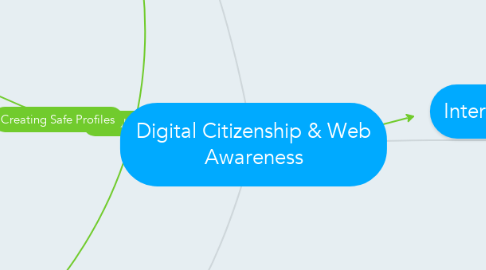
1. Ethics
1.1. Copyright
1.1.1. Sharing rights
1.1.1.1. Profit
1.1.1.2. Personal
1.1.2. Usage rights
1.1.2.1. Public
1.1.2.2. Private
1.2. Plagiarism
1.2.1. Citing sources
1.2.2. Intellectual Property
1.3. Cyberbullying
1.3.1. Student Awareness/Safety
1.3.2. Instantaneous
1.3.3. Always Connected
1.3.4. Ease of Access
1.3.5. Netiquette
1.4. Improper use/Abuse
1.4.1. Sexual conent
1.4.2. Violent content
1.4.3. Unreliable Sources
1.4.4. Hacking
1.4.5. Viruses
1.4.6. Malware
2. Digital Footprint
2.1. Web history
2.1.1. Search Items
2.1.1.1. Tracking
2.1.2. Social Media
2.1.2.1. Facebook
2.1.2.2. Twitter
2.1.2.3. Google Plus
2.1.2.3.1. Communities
2.1.2.4. Pinterest
2.1.2.5. Linkedin
2.1.2.6. 4Square
2.1.2.7. Instagram
2.1.2.8. Tumblr
2.1.2.9. Flickr
2.1.3. Profiles/Accounts
2.1.3.1. "Internet Identity"
2.2. Cookies
2.2.1. Targeted Advertisements
2.2.2. Tracking
2.2.3. Online shopping
2.2.3.1. Protect Banking Information
2.2.4. IP Address
2.2.4.1. Location
3. Internet Safety
3.1. Passwords
3.1.1. Variety
3.1.2. Change Often
3.1.3. Uses proper format
3.2. Privacy
3.2.1. Security settings on profiles/accounts
3.3. Anonymity
3.3.1. No photos
3.3.2. Fake name
3.3.3. No addresses made public
3.3.4. No sharing of banking information
3.4. Knowing who you're talking to
3.4.1. Reputable chat rooms
3.4.2. Mutual contacts
